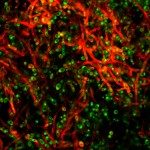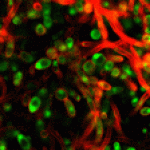Lien vers Pubmed [PMID] – 20194705
Antimicrob. Agents Chemother. 2010 May;54(5):2096-111
Candida albicans can form biofilms that exhibit elevated intrinsic resistance to various antifungal agents, in particular azoles and polyenes. The molecular mechanisms involved in the antifungal resistance of biofilms remain poorly understood. We have used transcript profiling to explore the early transcriptional responses of mature C. albicans biofilms exposed to various antifungal agents. Mature C. albicans biofilms grown under continuous flow were exposed for as long as 2 h to concentrations of fluconazole (FLU), amphotericin B (AMB), and caspofungin (CAS) that, while lethal for planktonic cells, were not lethal for biofilms. Interestingly, FLU-exposed biofilms showed no significant changes in gene expression over the course of the experiment. In AMB-exposed biofilms, 2.7% of the genes showed altered expression, while in CAS-exposed biofilms, 13.0% of the genes had their expression modified. In particular, exposure to CAS resulted in the upregulation of hypha-specific genes known to play a role in biofilm formation, such as ALS3 and HWP1. There was little overlap between AMB- or CAS-responsive genes in biofilms and those that have been identified as AMB, FLU, or CAS responsive in C. albicans planktonic cultures. These results suggested that the resistance of C. albicans biofilms to azoles or polyenes was due not to the activation of specific mechanisms in response to exposure to these antifungals but rather to the intrinsic properties of the mature biofilms. In this regard, our study led us to observe that AMB physically bound C. albicans biofilms and beta-glucans, which have been proposed to be major constituents of the biofilm extracellular matrix and to prevent azoles from reaching biofilm cells. Thus, enhanced extracellular matrix or beta-glucan synthesis during biofilm growth might prevent antifungals, such as azoles and polyenes, from reaching biofilm cells, thus limiting their toxicity to these cells and the associated transcriptional responses.



